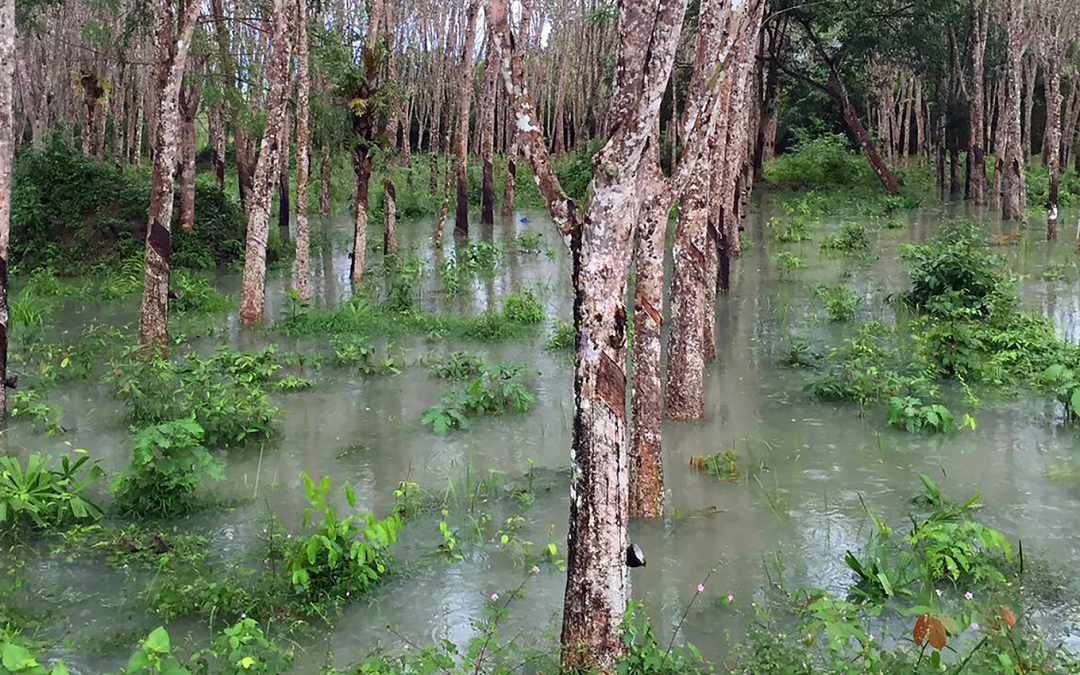
In a bid to tackle low rubber prices, the Thailand government has approved various schemes, including a loan package worth 20 billion baht for entrepreneurs who agree to purchase and stock rubber, the Bangkok Post has reported. The Natural Rubber Policy Committee chaired by Prime Minister Prayut Chan-o-cha has given the final nod for the measures.
The government will subsidise a three percent interest rate for loans, amounting to about 600 million baht, taken out by entrepreneurs who agree to purchase rubber and keep in their stockpiles.
“The loan package will prompt entrepreneurs to buy 100,000 tonnes of dry rubber sheet, representing 80% of the dried rubber sheet in the market. The committee also approved state agencies buying more natural rubber to use for construction of roads and sports fields. Many state agencies still have budget left for building roads and sports fields, so they will be asked to buy more latex from farmers to be used for construction,” the Bangkok Post report quoting Grisada Boonrach, agriculture and cooperatives minister, has said.
The government expected state enterprises to buy a total 180,000 tonnes of latex from farmers, rising from 70,000-80,000 tonnes a year in an earlier plan. Combined spending is estimated at 12.7 billion baht.
Nine organisations-Agriculture Ministry, Defence Ministry, Transport Ministry, Education Ministry, Natural Resources and Environment Ministry, Public Health Ministry, Interior Ministry, Tourism and Sports Ministry and Bangkok Metropolitan Administration- were instructed to speed up the use of rubber to lift domestic demand and shore up falling rubber prices, the Bangkok Post report said.
The government will subsidise a three percent interest rate for loans, amounting to about 600 million baht, taken out by entrepreneurs who agree to purchase rubber and keep in their stockpiles.
“The loan package will prompt entrepreneurs to buy 100,000 tonnes of dry rubber sheet, representing 80% of the dried rubber sheet in the market. The committee also approved state agencies buying more natural rubber to use for construction of roads and sports fields. Many state agencies still have budget left for building roads and sports fields, so they will be asked to buy more latex from farmers to be used for construction,” the Bangkok Post report quoting Grisada Boonrach, agriculture and cooperatives minister, has said.
The government expected state enterprises to buy a total 180,000 tonnes of latex from farmers, rising from 70,000-80,000 tonnes a year in an earlier plan. Combined spending is estimated at 12.7 billion baht.
Nine organisations-Agriculture Ministry, Defence Ministry, Transport Ministry, Education Ministry, Natural Resources and Environment Ministry, Public Health Ministry, Interior Ministry, Tourism and Sports Ministry and Bangkok Metropolitan Administration- were instructed to speed up the use of rubber to lift domestic demand and shore up falling rubber prices, the Bangkok Post report said.
The government will subsidise a three percent interest rate for loans, amounting to about 600 million baht, taken out by entrepreneurs who agree to purchase rubber and keep in their stockpiles.
“The loan package will prompt entrepreneurs to buy 100,000 tonnes of dry rubber sheet, representing 80% of the dried rubber sheet in the market. The committee also approved state agencies buying more natural rubber to use for construction of roads and sports fields. Many state agencies still have budget left for building roads and sports fields, so they will be asked to buy more latex from farmers to be used for construction,” the Bangkok Post report quoting Grisada Boonrach, agriculture and cooperatives minister, has said.
The government expected state enterprises to buy a total 180,000 tonnes of latex from farmers, rising from 70,000-80,000 tonnes a year in an earlier plan. Combined spending is estimated at 12.7 billion baht.
Nine organisations-Agriculture Ministry, Defence Ministry, Transport Ministry, Education Ministry, Natural Resources and Environment Ministry, Public Health Ministry, Interior Ministry, Tourism and Sports Ministry and Bangkok Metropolitan Administration- were instructed to speed up the use of rubber to lift domestic demand and shore up falling rubber prices, the Bangkok Post report said.